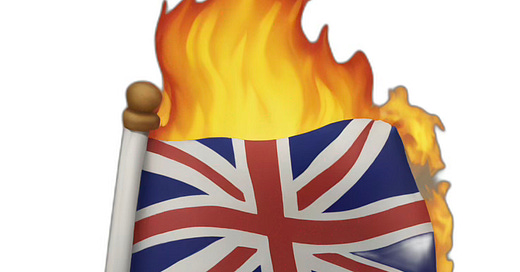
Homegrown Violence, Globalized Extremism
Rioting in the UK has domestic causes, but was stoked by Elon Musk and the international far right
The recent riots in the U.K. erupted in the wake of a vicious stabbing attack in Southport. A teenage boy attacked a Taylor Swift-themed dance class for young girls, killing three and wounding more. In the initial aftermath, the attacker’s identity was withheld, opening a window for a made up narrative that he was a recent immigrant of Muslim faith.
In reality, the killer was born in Cardiff to Rwandan immigrants and raised as a Christian. He was no less British than the rioters who went out to intimidate neighbors and lay waste to their own communities. He was no less British than his victims. In all of this, the violence came not from afar, but from Britain itself.
However, disinformation and agitation about the incident did come from actors outside Britain—from clickbait websites and internationally-known media figures. People were assaulted, windows smashed, mosques vandalized, libraries burned, and neighborhoods left terrified as mobs took to the streets in the name of Britain, carried along by a steady stream of hate and propaganda pouring in from around the world.
Setting Fires at Home, Stoking Flames From Abroad
A clickbait site called Channel3Now posted the story with the false identity of the attacker and the allegation that he was a recent illegal migrant. BBC reporter Marianna Spring found no evidence of the site being linked to the Russian state, as some have alleged. But the damage was real.
Sexist man-fluencer Andrew Tate, who is facing human trafficking charges in Romania, posted a video to X alleging the Southport attacker was “undocumented” and had come to the U.K. by boat.
Tommy Robinson, the nom de fasciste of Luton-born Stephen Yaxley-Lennon, played his part while on holiday in Cyprus. The founder of the English Defence League, Robinson left Britain in July despite a pending court date for contempt, a charge he incurred for violating a judge’s orders following a 2021 defamation case.
Posting furiously to his 900,000+ followers on the platform, Robinson coordinated protests and spewed bile, all from an X account that was only reinstated last year.
As the unrest mounted, Elon Musk joined in, reposting and later deleting a lie from a far-right activist that claimed the U.K. government planned to inter rioters in “detainment camps.”
With hate and rage flooding social media platforms, many far-right actors were quick to co-opt the rush of bad information for their own purposes.
Marchers draped themselves in Union Jacks and the English St. George’s flag. They threw bricks and other objects, menaced and even attacked non-white individuals, and chanted viciously bigoted slogans. In Middlesbrough, rioters set up roadblocks and could be heard asking drivers if they were white before allowing them to pass.
But Rotherham became the darkest and most harrowing symbol of the riots. Amassed outside the Holiday Inn Express, where the British government was housing asylum seekers, rioters smashed windows and eventually set fire to part of the building. It had all the markings of a lynch mob or a pogrom, a siege that felt at once medieval and thoroughly modern. Screams of “get them out” can be heard in videos from the scene.
Protesters in London chanted “Rule Britannia,” “save our kids,” and “stop the boats,” and scuffled with police near the Prime Minster’s residence at Downing Street. “Stop the boats” has become an anti-immigrant rallying cry since it was deployed by Rishi Sunak’s government as part of a pledge to stop illegal immigrants entering the U.K. via small boats crossing the English Channel.
Even as the violence escalated, Musk and others continued to promote hateful stereotypes and use extremist rhetoric online. Posting a reply to riot footage—thereby bringing it to the attention of millions—that was shared by the Libs of TikTok account, an account that’s own contributions to far-right extremism has been well documented, Musk declared “civil war is inevitable,”
It’s an astonishingly irresponsible and loathsome comment from a man who insists his social media platform is “the global town square.” Musk has also squared off with British politicians, including Prime Minister Keir Starmer, suggesting Starmer isn’t concerned about “all communities” and labeling the police response as “one-sided.”
More recently, Musk posted a luridly racist meme, premised on equating immigration to graphic, interracial pornography. If anything, he has turned even more virulent and grotesque in his racism during the U.K. unrest.
The Globalized Far Right and Britain’s Crisis
Musk is the owner and most prominent user of X, formerly known as Twitter. But he is far from the only user outside the U.K. who has been stoking hatred and spreading disinformation.
It’s come from accounts large and small. Northamptonshire police arrested a middle-aged child care worker after she wrote, “Mass deportation now, set fire to all the f****** hotels full of the b******* for all I care... If that makes me racist, so be it.” The wife of a Conservative councilor, she has since deleted the post, apologized, and said she was deceived by disinformation.
On Rumble, Turning Point USA’s Charlie Kirk invited Tommy Robinson on his show to discuss the riots. Robinson bemoaned the increase in the number of mosques in Britain and told Kirk, “we are fighting for our survival.”
The online exploitation of the situation by figures in the U.S. and elsewhere is a good example of how far-right ideas and agitation have globalized. We live in an age where extremist content flows across borders as easily as the material goods, pop culture, and tourists we typically celebrate as representative of an ever-more connected world.
Scholar Cynthia Miller-Idriss has argued that myriad material and virtual spaces now provide gathering points for extremists and incubators for far-right ideas. Fostering new online spaces and evading moderation are easier for them now that Elon Musk has turned X into a freewheeling home for racist, misogynistic, and conspiratorial content.
Controlling content like this is a labyrinthine problem for national and local governments, as well as the platforms themselves. Most social media companies take some responsibility for restricting this sort of hateful and dangerous content, but Musk has thumbed his nose at most calls for moderation, crowing that he is a champion of free speech. X CEO Linda Yaccarino recently declared that the site is “…the one and only place you can express yourself freely and openly.”
But that’s true only for speech Musk likes. For example, instances of the n-word and other racist slurs has soared since Musk took over, while X suspends users for posting the terms “cis” and “cisgender” after Musk declared them unacceptably offensive. Ahead of elections in Turkey and India, he took down political opposition posts at government request.
That brings us to the question of censorship itself. Liberal democracies take somewhat different approaches to how speech ought to be policed, even within the broad parameters of free speech rights. British law does place more restrictions on hateful or potentially harmful posts, and U.K. officials have suggested there ought to be consequences for those engaging in incitement from abroad. Still, many posts like Musk’s and other offensive and dishonest content aren’t considered illegal. Even in extreme circumstances, the likelihood of an American being extradited to Britain over social media posts is extremely low. But the rhetoric does highlight the fraught nature of how extremism operates in a globalized communication environment.
Although he is excessively self-regarding, Musk is not entirely wrong in calling his site a global town square. The internet is indeed a gigantic social gathering point. It’s just that his site is only one small corner of it. The reality is much messier and more expansive. The platforms are many, and the networks are complex. The nature of communication and commerce in the current age means that dangerous ideas and beliefs can spread quickly across borders and between communities. As the events in the U.K. have shown, it also means that global sources of extremism cannot be easily separated from crises of domestic radicalization.





